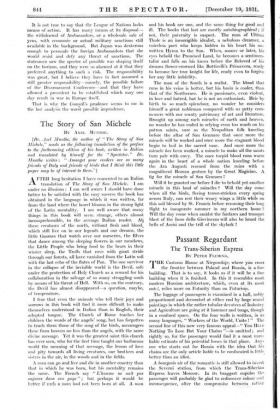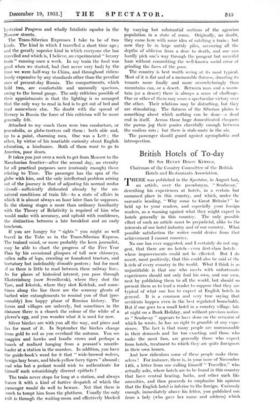Passant Regard.ant
The Trans-Siberian Express
BY PETER FLEMING.
THE Customs House at Niegoroloje, where you cross the frontier between Poland and Russia, is a fine building. That is to say, it looks as if it will be a fine building when it is finished. In this it resembles most modern Russian architecture, which, even at its most outré, relies more on Futurity than on Futurism.
The luggage of passengers is examined in a hall, nobly proportioned and decorated at either end by large mural paintings in which the rather tubular devotees of Industry and Agriculture are going at it hammer and tongs,. though in a confined space. On the four walls is written, in as many languages, "Workers of the World, Unite !:" The second line of this now very famous appeal—" You Have Nothing To Lose But Your Chains "—is omitted ; and rightly so, for the passenger would find it a most unre- liable estimate of his potential losses in that place. Any- one who starts out for Russia with the idea that his chains are the only article liable to be confiscated is little, better than an idiot. . , A bourgeois air of the romantic is still allowed to invest the Severni station, from which the Trans-;Siberian Express leaves Moscow. In its braggart cupolas the passenger will probably be glad to rediscover Colour and inconsequence, after the compromise between rather hysterical Progress and wholly fatalistic squalor in the Tiloscow streets.
The Trans-Siberian Expresses I take to be of two kinds. The kind in which I travelled a short time ago ; and the greatly superior kind in which everyone else has travelled and which is, I believe, an experimental " luxury train" running once a week. In my train the food was good when we started, bad (but never very bad) by the time we were half-way to China, and throughout ridicu- lously expensive by any standards other than the peculiar ones of present-day Russia. The compartments, which hold two, are comfortable and unusually spacious, owing to the broad gauge. The only criticism possible of their appointments is that the lighting is so arranged that the only way to read in bed is to get out of bed and read somewhere else. No doubt with the spread of literacy in Russia the force of this criticism will be more generally felt.
Attached to my coach there were two conductors, or provodniks, as globe-trotters call them : both able and, up to a point, charming men. One was a Lett ; the other, by virtue of his insatiable curiosity about English education, a hindrance. Both of them want to go to America, poor dears.
It takes you just over a week to get from Moscow to the Manchurian frontier—after the second day, an eternity for all practical purposes save (curiously enough) those relating to Time. The passenger has the spin of the globe with him, and the only intellectual problem arising out of the journey is that of adjusting his normal modus rivendi—sufficiently dislocated already by the un- natural conditions of train life—to a state of affairs in which it is almost always an hour later than he supposes.
In the closing stages a more than ordinary familiarity with the Theory of Relativity is required of him who would make with accuracy, and uphold with confidence, the distinction between a late breakfast and an early luncheon., If you are hungry for " sights " you might as well travel in the Tube as in the Trans-Siberian Express.
The trained mind, or more probably the keen journalist, may be able to chart the progress of the Five Year Plan by his occasional glimpses of tall new chimneys, sullen rafts of logs, crawling or foundered tractors, and hortatory but indefinably dented& posters ; but for most 3f us there is little to read between these railway lines.
As for places of historical interest, you pass through Ekaterinburg (now Sverdlovsk), where they shot the Tsar, and Irkutsk, where they shot Kolchak, and some- times along the line there are the scrawny ghosts of barbed wire entanglements to remind you of that (pre- sumably) less happy phase of Russian history. The farms and villages are unlovely, but sometimes in the distance there is a church the colour of the white of a plover's egg, and you wonder what it is used for now.
Silver birches are with you all the way, and pines and firs for most of it. In September the birches change from gold to red as you overhaul the autumn. You see magpies and hawks and hoodie crows and perhaps a bunch of mallard hanging from a peasant's muzzle- loader at a station in the marshes. In addition, you have the guide-book's word for it that " wide-browed wolves, benign lazy, bears, and black-yellow furry tigers " abound ; and who but a pedant would wish to authenticate for himself such astonishingly discreet epithets ?
The train never stops for long at a station, and always leaves it with a kind of furtive despatch of which the passenger would do well to beware. Not that there is much to tempt him from the platform. Usually the only exit is through the waiting-room and effectively blocked by varying but substantial sections of the agrarian population in a state of coma. Originally, no doubt, they came here with some idea of catching a train ; but now they lie in large untidy piles, savouring all the depths of oblivion from a doze to death, and one can hardly pick one's way through the pungent but merciful haze without committing the well-known social error of grinding the faces of the poor.
The country is best worth seeing at its most typical. Most of it is flat and of a memorable flatness, dwarfing its tenants more finally and more overwhelmingly than mountains can, or a desert. Between man and a moun- tain (or a desert) there is always a sense of challenge. One or other of them may score a spectacular victory over the other. Their relations may be disturbing, but they are stimulating. The flatness of the Siberian plains is something about which nothing can be done—a dead end in itself. Across those huge domesticated chequers the pawns jog their ponies cheerfully enough between the endless ruts ; but there is stale-mate in the air.
The passenger should guard against agoraphobia and introspection.



































 Previous page
Previous page